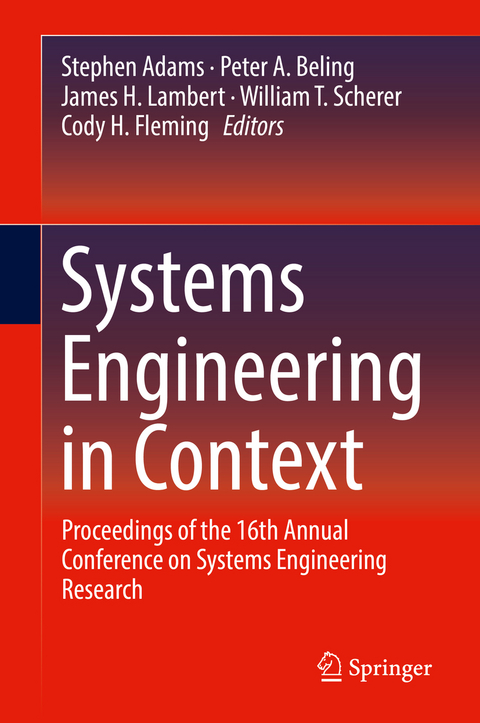
Systems Engineering in Context
Springer International Publishing (Verlag)
978-3-030-00113-1 (ISBN)
This volume chronicles the 16th Annual Conference on System Engineering Research (CSER) held on May 8-9, 2018 at the University of Virginia, Charlottesville, Virginia, USA. The CSER offers researchers in academia, industry, and government a common forum to present, discuss, and influence systems engineering research. It provides access to forward-looking research from across the globe, by renowned academicians as well as perspectives from senior industry and government representatives. Co-founded by the University of Southern California and Stevens Institute of Technology in 2003, CSER has become the preeminent event for researchers in systems engineering across the globe.
Topics include though are not limited to the following:
Systems in context:
· Formative methods: requirements
· Integration, deployment, assurance· Human Factors
· Safety and Security
Decisions/ Control & Design; Systems Modeling:
· Optimization, Multiple Objectives, Synthesis· Risk and resiliency
· Collaborative autonomy
· Coordination and distributed decision-making
Prediction:
· Prescriptive modeling; state estimation
· Stochastic approximation, stochastic optimization and control
Integrative Data engineering:
· Sensor Management· Design of Experiments
Dr. Stephen C. Adams is a Senior Research Scientist in the Department of Systems and Information Engineering at the University of Virginia. Dr. Peter A. Beling is Professor and Interim Chair of the Department of Systems and Information Engineering at the University of Virginia. Dr. James H. Lambert is Research Professor of Systems & Information Engineering, Research Professor of Engineering & Society, and Associate Director of the Center for Risk Management of Engineering Systems, at the University of Virginia. Professor William T. Scherer is an expert in systems engineering, stochastic control, and business analytics and has served on the University of Virginia Department of Systems and Information Engineering faculty since 1986.
Towards Achieving Architecture Alignment of Business and IT: A Portfolio Decision Analysis Approach.- Emergent network of systems implication for system design.- Using system engineering ilities to better understand resiliency.- Military enterprise wireless communications architecture power analysis.- Grand Challenges in Systems Engineering education.- The joint optimization of critical interdependent infrastructure of an electricity-water-gas system.- Architecture models for coordination of unmanned air and ground vehicles conducting humanitarian assistance and disaster relief.- A Dynamic Model of Military Suicide for Improved Understanding of Effects and Integration of Interventions.- Foundational and precautionary considerations for value-driven tradespace exploration and analysis.- Designing Engineered Resilient Systems Using Set-Based Design.- Candidate Architecture for an Active Orbital Space Debris Removal System.- How do Knowledge Domains come together in Systems?.- Review and Constructive Definitions for Mathematically Engineered Systems as Categorical Interpretation.- Systems Engineering Grand Challenges in Security and Safety .- Application of the Rayleigh Model to Predict Information Technology Program Cost and Schedule Performance.- Integrating set-based design into cost analysis.- A proposed application of systems engineering principles to healthcare decision-making: evaluating patient decision regret in the treatment of oropharyngeal cancer.- How frustrations about oversight can lead to inefficiencies in contractor work.- A method to use the SoS Explorer application with fuzzy-genetic algorithms to support military veterans within higher education.- DisplayText cannot span more than one.- The Data-Ontology-Rule Footing: A Building Block for Knowledge-based.- Why not Teaching systems Architecture as a Studio Art Class?.- A Research Plan to Discover Patterns of Unknown Vulnerabilities Associated with Adopting SysML.- Optimizing Fleet Life Cycle Management Decisions Through Graphical Dominance Analysis.- Comparing Frequentist and Bayesian Approaches for Forecasting Binary Inference Performance.- The Danger of Using Ratio Performance Metrics in System Evaluations.- Uncertain Requirements in the Design Selection Problem.- Uncertain Requirements in the Design Selection Problem.- A Pilot Study on Ranking the Critical Components of a System.- A Method for Robust Requirements Definition.- Identifying Barriers to Agile Technology Roadmapping.- A system of Knowledge Briefs to support decision-making and knowledge reuse in product development.- Ontology Driven Requirements Engineering in the Responsive and Formal Design Process.- A Review of Value Modeling in the NASA Systems Engineering Research Consortium.- Risk Analysis and Prognostics and Health Management for Smart Manufacturing.- Technology maturity in NASA's Small Business Innovation Research Program.- Visualizing Communication Patterns in Design Teams Over Time.- A Value-Centric Tradespace Approach to Target System Modularization.- Framework for Design Exploration of Secure Embedded System Development.- Engineering Elegant Systems: Postulates, Principles, and Hypotheses of Systems Engineering.- Exergy Efficiency of Interplanetary Transfer Vehicles.- Information Theory Applied to Decision Making Structures.- Using MBSE in satellite architecture trade studies: a practical example.- Systems of Systems Thinking.- Information Entropy Based Complexity Measurement for Systems Engineering and Trade-off Analysis.- Capturing the Information Dependencies of Verification Activities with Bayesian Networks.- Shape Inspection Using N-View Error Accumulation On Low-fidelity Point Clouds.- Investigating approaches to achieve modularity benefits in the acquisition ecosystem.- A Domain Engineering Framework Based on Probabilistic Ontologies for Automated Selection of Features to Reuse.- Rapid Prototyping Insider Threat Inference Enterprise Model Workflows Using Ontology-Template Approach.- Synthesizing Inference Enterprises from Redacted Data.- Cyber-Physical Systems Modeling for Security Using SysML.- How Will Humans Cut through Automated Vehicle Platoons in Mixed Traffic Environments? A Simulation Study of Drivers' Gaze Behaviors based on the Dynamic Areas-of-Interest.
| Erscheinungsdatum | 18.01.2019 |
|---|---|
| Zusatzinfo | XXX, 716 p. 199 illus., 155 illus. in color. |
| Verlagsort | Cham |
| Sprache | englisch |
| Maße | 155 x 235 mm |
| Gewicht | 1280 g |
| Themenwelt | Technik ► Elektrotechnik / Energietechnik |
| Schlagworte | Collaborative autonomy of Systems • Control and Design in Systems • Design of Experiments in Systems • Human Factors and systems • INCOSE • Integration, deployment, assurance of systems • Integrative Data engineering • Multiple Objectives in Systems • Quality Control, Reliability, Safety and Risk • Risk and resiliency of Systems • Safety and Security of Systems • stochastic approximation • stochastic optimization and control • Systems Decisions • systems modeling • systems optimization |
| ISBN-10 | 3-030-00113-X / 303000113X |
| ISBN-13 | 978-3-030-00113-1 / 9783030001131 |
| Zustand | Neuware |
| Haben Sie eine Frage zum Produkt? |
aus dem Bereich


